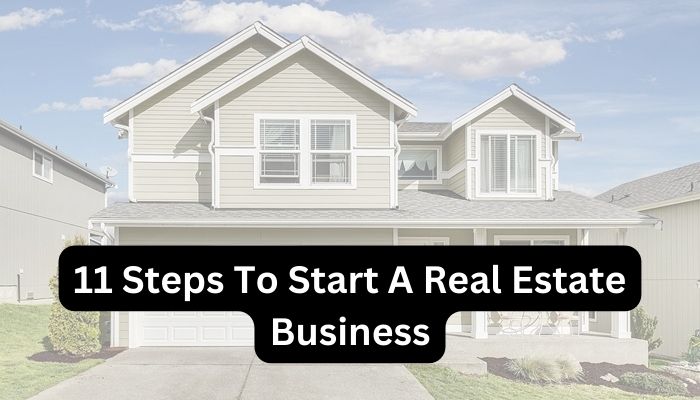11 Steps To Start A Real Estate Business – As entrepreneur and author Robert Kiyosaki says, “Real estate investing, even on a very small scale, remains a tried and true means of building an individual’s cash flow and wealth.”
The first thing you need to know about starting a real estate business is that, yes, this is a business. Whether you’re a solo agent or new to a team, if you have dreams of outperforming the average real estate agent salary ($44,507 per year), you need to start thinking like a business owner — and that means planning.
What is a real estate business?
A real estate business is a company that handles all types of real estate matters. These include buying, selling, managing and investing in real estate. Some agencies handle all of these things, while others specialise in buying and selling homes. You can also become a real estate broker, which involves advising customers on their real estate investments and helping them through the purchase process
If you’re wondering how to start a real estate agency of your own, you’ll need to be prepared for some hard work. Due to the requirements of obtaining the appropriate licenses, you could spend two years or more planning your business before you get started.
11 Steps To Start A Real Estate Business:

1. Pick A Specific Real Estate Niche:
First, choose your real estate business niche. This is a vast sector where plenty of businesses are active. You just cannot work in all of the niches as that is not viable and practical initially.
Here Is The List Of Main Real Estate Business Niches :
Residential real estate
Resort and vacation homes
Income properties, the ones that real estate investors buy to have income through leasing or rental.
Condos
Commercially zoned real estate properties
Property management
Rental Property
Your startup cannot do business in all of these niches. So, to work efficiently, pick one or at best two specific niches of your interest. The best way to choose is to prefer the field that you have worked in previously.
Adopt a narrow-down approach to zero into the niche of your liking. You may have experience buying and selling condos, the pick condos. Or, if you specialize in short sales, then choose rental property management.
Even when you think about how to start a real estate business with no money, a niche is essential to start about. You simply cannot excel in this business without focusing on a distinctive niche.
2. Create a business plan:
A business plan is always recommended when starting any new venture. Whether you want to open a real estate business or start selling handmade crafts at a market, you need to map out the risks, the costs, expected income, your pricing structure, what you need to get started and much more. Your plan should consider everything, down to the tools you’ll use for invoicing customers.
8 Ways To Make Money With Airbnb Without Owning Property
A good business plan provides a clear picture of the feasibility and projections for your business, so it’s a great document to keep you on track. However, more than being just a personal ‘to-do list’, a business plan is an important document if you intend to seek finance from lenders or investors. They will want to see that you’ve done your research and planned accordingly, which is why the finance section of your business plan is so important.
3. Get a real estate license:
Obtaining a real estate license is an important first step in your real estate career. The timeline, qualifications, and costs of getting your real estate license are different from state to state, so consult your local real estate bureau to understand what’s required.
Many states require pre-licensing and renewal courses as well. Once you have your license, however, you can legally sell, broker, or rent real estate in the state in which you’ve obtained your license. There’s one caveat here: Most states require you to work with a brokerage for the first two to three years as an agent. So let’s dive into what that means.
4. Financing Your Business:
Securing the necessary funding is one of the most challenging aspects of starting a real estate business. This may involve tapping into personal savings, obtaining a bank loan, or finding investors. Understanding your financial needs and options is essential, as is a solid budgeting plan that accounts for both expected and unexpected expenses.
5. Organise your finances:
You don’t necessarily need a lot of capital to start a real estate business, aside from the appropriate industry fees you may be required to pay. However, consider the other things a successful real estate agency requires. An office space, certainly. Perhaps a professional vehicle? Furnishings for the office space, insurance and egal representation. You should also consider branding and signage and r website.
How To Start A Laundromat Business
You may consider a business loan, seeking external investors, going into a partnership or several other ways to finance the setup
6. Choose your business location:
When working in real estate, it’s a lot more effective if you can contain your work to a specific geographic location. Preferably this would be close to your home because it makes those after-hours walk-throughs much easier. You also have a personal connection and insight into the local area. Reducing travel frees up time and reduces expenses. So, it’s best to choose a location that has alot of real estate activity or gaps in the market. Your early market research may give you some insights into this.
7. Property Acquisition:
Acquiring the right properties is the heart of your real estate business. This involves not just finding properties but also assessing their potential for profit, whether through rental income, resale, or development. It requires a good understanding of the market, negotiation skills, and an eye for properties that offer good value.
8. Get business insurance:
The insurance side of running a business can be difficult to navigate if you’ve never done it before. For a real estate business, you may need multiple types of coverage, including:
Professional indemnity
Cyber and crime
Public liability
Management liability
Worker’s compensation
Business insurance
When determining how to start a real estate agency, consider the cost of all the necessary insurance types. There are companies specialising in real estate insurance, so it may be worth seeking them out and asking for a quote.
9. Develop a marketing plan:
It’s one thing knowing how to start a real estate business, but it’s another to actually market it effectively. Again, your market research will inform some of the decisions you make about marketing, but it’s worth exploring all options.
Naturally, you’ll have industry tools such as realestate.com.au, but you’ll need to get the word out there with more than online marketing. Marketing plans involve all types of activities, including:
Social media
Search Engine Optimisation (SEO)
Pay-per-click (PPC) advertising
Signage
Brochures
Radio/TV advertising
Video marketing
Cold-calling
Email marketing
This list isn’t exhaustive, but it shows you all the avenues you have at your disposal to capture your audience’s attention. When planning your marketing, consider how much you can automate or outsource, such as email marketing.
10. Networking and Relationship Building:
The real estate industry is built on relationships. Networking with other real estate professionals, potential clients, and investors is essential. Attend industry events, join real estate forums, and consider partnering with other businesses. Building strong relationships can lead to new opportunities and referrals.
11. Growth and Expansion:
Lastly, consider how you’ll grow and expand your real estate business. This could involve diversifying into different types of real estate, expanding into new geographic areas, or scaling up your investments. Continuous learning and adapting to market changes are vital for long-term success.
Top 5 Benefits of A Real Estate Business:
- Steady Income Stream: One of the most attractive aspects of a real estate business is the potential for a consistent and steady income, primarily through rentals. This can provide financial stability and a cushion against market fluctuations.
- Property Value Appreciation: Over time, real estate typically appreciates in value. This long-term appreciation can result in significant profit when properties are sold.
- Tax Advantages: Real estate investors benefit from various tax deductions, including depreciation, mortgage interest, and property tax deductions, which can significantly reduce tax liability.
- Diversification of Investment Portfolio: Investing in real estate is an excellent way to diversify your investment portfolio, reducing risk and improving overall financial health.
- Inflation Hedging: Real estate is often considered a hedge against inflation. As living costs rise, so do rental incomes and property values, helping to protect your purchasing power.

